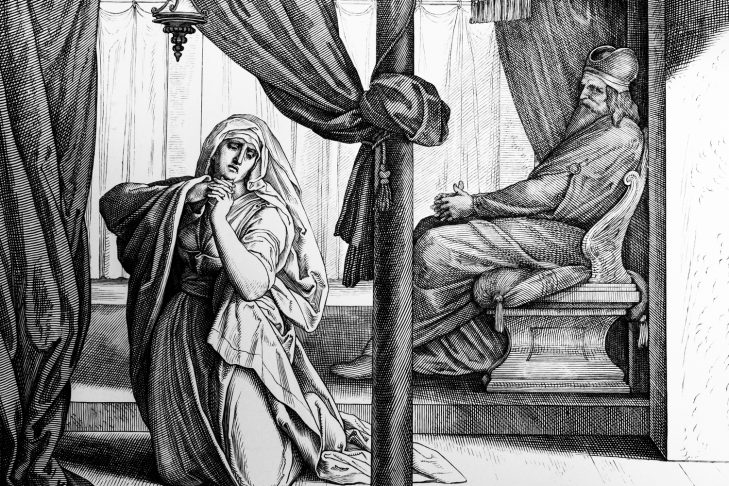Genesis 24
"Will you go with this man?"
Joy and fear
flood me all at once.
Somewhere out there
a man is waiting,
waiting to love me.
Somewhere out there
is a new future -
fulfillment of my dreams.
I want to say Yes.
And yet
he is a total stranger;
I've never seen his face,
don't know if he'd be kind to me,
don't know if we'd agree
on all that is important,
or always fight instead.
I am afraid
of this strange new future,
this unknown shadow
who wants me to be his;
I am afraid
of regretting my decision,
of being stuck forever
in a strange land
with a man I might not love.
So much could go wrong.
And yet
I see your fingerprints
on the tangled strings of my story -
signs that say you're leading this,
signs that say you have a plan.
Love is a risk -
so much could go wrong.
What if I don't like him,
or we cannot agree?
Love is a risk
but so is everything,
and if I heed all my fears
I never will live.
I'll turn away from my fears,
and look upon You,
and trust You to guide me
and know what is best.
Take my trembling heart -
take my fears away.
I know what I desire,
I know I must dare -
for love is a risk
always worth taking.
"Will you go with this man?"
- Yes, I will go.
_________________________________________________________________
[November 2012 - commentary August 2014]
"Every time we make the decision to love someone, we open ourselves to great suffering, because those we most love cause us not only great joy but also great pain. [...] Still, if we want to avoid [suffering], we will never experience the joy of loving. [...] We have to trust that the risk of loving is always worth taking." (Henri Nouwen)
Based particularly on Genesis 24:58 which is quoted at the beginning and end of the poem - Rebekah is given the choice whether she wants to go with Abraham's servant to be Isaac's wife. I decided to look at the decision process here.
This story happened in the days of arranged marriage in a culture where family connections were practically the most important consideration. Abraham's servant was sent to find Isaac a wife from among his own relatives (and Rebekah was a cousin or something). Although there's still many places in the world where marriages happen this way, with people hardly knowing each other beforehand and love being something in the future that they will build up, rather than being the precondition to getting married, it's increasingly no longer the case. We don't expect to be matched up with a total stranger, and don't have to make the kind of choice Rebekah did.
Nonetheless, I often get the feeling that even if one has gotten to know someone and grown to care for him, so much about him remains a mystery. Love remains a risk - because who knows how many exasperating things might be hiding inside that person that now we don't see (maybe because love made us blind) but that annoy us years later! Which is why I also believe it's important to realise that even if one already knows and loves the person one marries, love is something that grows. Marriage does not happen at the "high point" of being in love, but is a point from which it has to continue on, because after that point, we're still going to get to know the other person more and more, and maybe things will come out that we don't like, or that simply get on our nerves. I believe love is more than "feelings"; it's a
decision we have to keep on making.
We often hear nowadays of divorce rates skyrocketing. I know people who, because of that, see marriage as too great a risk - who knows, you might "fall out of love" at some point or feel like no longer going on - and would rather just live together in a relationship. I think it's good to recognise that marriage is a risky decision. But I believe that is not a reason to give up on the idea altogether. It's a risk that,
with God, I believe is worth taking. So many things in life are risky and could end in a mess - but if we risk nothing, we won't live. And I believe that holding on to the fact that
God led you together can give the strength to
decide, again and again, to keep forgiving and enduring and loving. Which is also why I believe asking about God's will in the matter is an important step before saying yes to anyone.
(Which however does not mean that it will always work out smoothly if you "add God to the equation". I've experienced it not working out like that. We can also misunderstand God's will - or have a partner who does not want to make another effort when we do, when things go wrong. However, I do believe that the Bible teaches us to overcome ourselves and make the extra effort to love, and that the kind of love the Bible speaks of - which is not just boy-girl / husband-wife love but the love we should have towards all people - is something active and something that involves decision and the will. So even if it does not "work" as a "save-your-marriage" method, I believe it is what we should do, because it's right and what true love is.)
And don't ask me how this turned into a treatise on love and marriage and divorce....................-__-;
Picture by Nicolò Grassi


